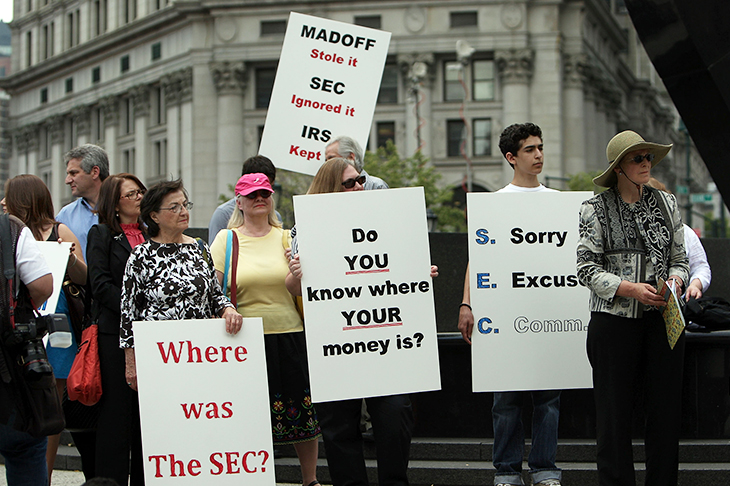Looking at morality, ethics and business

Before business financier Bernard Madoff was sentenced in 2009 for defrauding investors of billions of dollars, victims of his fraud held a news conference and protest. (Photo by Spencer Platt/Getty Images)
When it comes to business scandals, names like Madoff, Leman and Enron are top of mind. But why do people misbehave in the marketplace? That was the subject of a conference on Friday (Oct. 10) at the A. B. Freeman School of Business at Tulane University. With discussions from anthropologists, psychologists, philosophers and military scholars, the meeting of the Moral Research Lab was no ordinary business conference.
“Morality and the Marketplace” was the first in-person meeting of the lab, a virtual group of interdisciplinary scholars who study morality and moral decision-making. Nine researchers affiliated with the lab including scholars from business, economics, psychology, philosophy and anthropology as well as representatives from the military, the National Institutes of Health and even a corporate fraud examiner presented research to help understand why people behave badly in the market.
“The researchers came together from all over to present their ideas about how to make this research more relevant to the practice of ethics,” said Janet Schwartz, organizer of the conference and assistant professor of marketing at the Freeman School.
Conference co-organizer Peter McGraw, associate professor of marketing at the University of Coloradoâ“Boulder, said that while the conference"s purpose wasn"t to tell people how to behave in a marketplace, the research presented can be used by future policymakers and executives to help create more ethical work environments.
“When people think about a business school, they often have a very narrow perception of what they do,” McGraw said. “Business schools have a much broader mission than most people assume, and I think a conference like this can help highlight that.”
By informing public policy, supporting entrepreneurs or helping consumer advocates, business schools can help understand the marketplace, he said.
“Morality in the Marketplace” was co-sponsored by the A. B. Freeman School of Business, the Murphy Institute, Duke University"s Center for Advanced Hindsight, and the D. W. Mitchell Lecture Fund as part of the Provost"s Faculty Seminars in Interdisciplinary Research.
Mark Miester is the editor of Freeman magazine for the A. B. Freeman School of Business.
—
